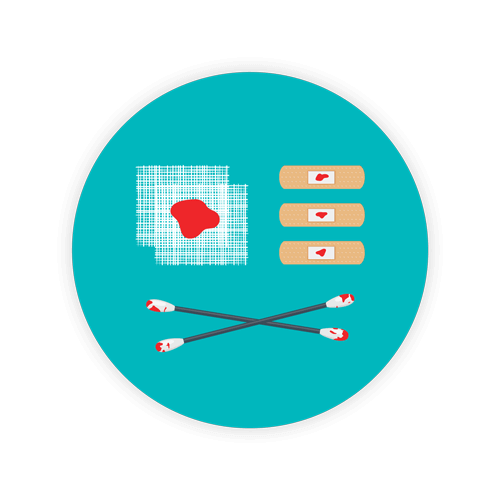Charlotte Healthcare Waste Management Tips

Ah, North Carolina… home to the Tar Heels, the testing grounds of Orville and Wilbur Wright’s first flight at Kill Devil Hills, and one of the original Thirteen Colonies, settled in 1755. One of the state’s most beautiful (and largest) city is Charlotte; situated in Mecklenburg County it is home to one of the fastest growing populations in the South. That means medical care from major hospitals to out-patient clinics and care centers to specialty practices such as orthopedics.
Of course, North Carolinians are more than familiar with the #1 ranked hospital in the state (Duke University Hospital) and Wake Forest Baptist Medical Center in Winston-Salem. Duke alone has nearly 1,000 beds while (system-wide) Wake Forest offers over 1,500. Founded in 1903, Charlotte’s Novant Health Presbyterian Medical Center offers residents nearly 700 beds.
Where are we going with this? Think of all the medical procedures and care and medical waste generated by these facilities. Charlotte healthcare providers should know and follow North Carolina biomedical waste management rules for segregating, packaging, storing, and transportation, treatment and ultimate disposal of medical waste. It behooves any medical waste generator in the city of Charlotte to review medical waste rules found in North Carolina’s administration codes. The foundation for non-hazardous medical waste can be found in 15 NCAC 13B.1201-13B.1204.
Charlotte medical waste management tips to live by
Daniels Health realizes that browsing through code after code of governmental regulatory agencies can be tedious, somewhat boring, and often complicated. Nevertheless, it’s essential to maintain compliance and avoid the risk of harming your employees, your patients, the general public, or the environment. We’re dedicated to preventing all of that through easy-to-find resources, support, and products.
That’s why we put together a number of tips for Charlotte’s biohazard waste management processes – to not only make your job easier, but safer.

Tip 01 / For medical waste considerations within the city limits of Charlotte, North Carolina (and throughout the state) it’s a good idea to know your governmental agencies and be aware of who enforces the rules. In North Carolina, as well as the city of Charlotte, rules for medical waste management must comply with (and are enforced by) the North Carolina Department of Environmental Quality, Division of Waste Management – Solid Waste Section regulations.
Tip 02 / Review and understand the different definitions for medical waste. For example, you’ll find a different definition between “general” non-hazardous medical waste and regulated medical waste, pathological waste, and so forth. The wording and processes for segregation and handling, as well as ultimate disposal processes and regulations differ between these waste streams.
 Tip 03 / Verify that you are properly disposing of sharps. Specific guidelines for sharps disposal can be found under North Carolina’s Administrative Code rules under the guideline for sharps (.1201(11). There is a difference in how sharps are to be collected and disposed of depending on the facility (hospital versus private household versus funeral home). For example, did you know that when used in funeral home practices, sharps, needles, or other sharp instruments are subject to the applicable requirements found in the medical waste rules (.1202(b))? Be aware of these differences. They may not seem like a big deal, but infractions and non-compliance can result in alarmingly serious fines and penalties.
Tip 03 / Verify that you are properly disposing of sharps. Specific guidelines for sharps disposal can be found under North Carolina’s Administrative Code rules under the guideline for sharps (.1201(11). There is a difference in how sharps are to be collected and disposed of depending on the facility (hospital versus private household versus funeral home). For example, did you know that when used in funeral home practices, sharps, needles, or other sharp instruments are subject to the applicable requirements found in the medical waste rules (.1202(b))? Be aware of these differences. They may not seem like a big deal, but infractions and non-compliance can result in alarmingly serious fines and penalties.
Tip 04 / Not all state governments require the same when it comes to biomedical waste management or overall healthcare waste management processes. For example, North Carolina doesn’t require that sharps be incinerated prior to disposal while others do. Medical waste management in North Carolina is not regulated by the US EPA. (Do be aware however, that medical waste guidelines in the state are under the authority of North Carolina’s medical waste rules.) Transportation of regulated medical waste in North Carolina must also comply with US Department of Transportation rules.
 Tip 05 / Throughout the state of North Carolina (including Charlotte), blood-soaked medical waste – including dressings, bandages, disposable instruments, used gloves, and tubing – are not included in the state’s definition of regulated medical waste. As such, North Carolina’s Department of Environmental Quality (NCDEQ) states that such waste can be disposed of without prior treatment in general solid waste streams but only with local government approval. So while the state of North Carolina isn’t regulated overall by federal EPA guidelines, the state itself mandates its own waste processes. In many circumstances, including the state of North Carolina, state guidelines are often stricter than those mandated by the federal government.
Tip 05 / Throughout the state of North Carolina (including Charlotte), blood-soaked medical waste – including dressings, bandages, disposable instruments, used gloves, and tubing – are not included in the state’s definition of regulated medical waste. As such, North Carolina’s Department of Environmental Quality (NCDEQ) states that such waste can be disposed of without prior treatment in general solid waste streams but only with local government approval. So while the state of North Carolina isn’t regulated overall by federal EPA guidelines, the state itself mandates its own waste processes. In many circumstances, including the state of North Carolina, state guidelines are often stricter than those mandated by the federal government.
Tip 06 / Read and review your governmental websites regarding definitions, rules, resources, and links to the information you’re looking for. North Carolina’s Environmental Quality website provides a link that covers a number of medical waste issues, including those that discuss approved medical waste treatment technologies, facilities, and guidance documents provided by the EPA on pharmaceutical waste disposal, among others.

Tip 07 / Healthcare facilities and biomedical waste generators in Charlotte are guided to other agencies for specifics in regard to segregation, handling, storage, and transportation of medical waste from their facilities. Among them include the United States EPA, the Occupational Safety and Health Administration (OSHA), the Department of Transportation (DOT), and North Carolina’s hazardous waste section, which follows guidelines and administers the Resource Conservation and Recovery Act subtitle C program.
Tip 08 / Daniels Health is not joking when it warns against non-compliance issues. Monetary fines for non-compliance can exceed thousands of dollars per day per violation until the infraction is corrected. Take advantage of the presentations and documents provided by the state of North Carolina to ensure compliance. One valuable resource is a presentation regarding medical waste management rules is offered in a presentation designed by the NCDEQ.
Daniels ensures knowledge and compliance
North Carolina government website pages offer a wide range of materials that break down information regarding institutionally generated medical waste in print, infographics, and PDF files. When it comes to compliance, there’s no excuse for not understanding the rules. Daniels Health is focused on not only helping medical facilities and medical waste generators maintain compliance, but to save money through proper waste segregation methodologies and whenever possible, management of hazardous waste on-site.
For more information on how Daniels Health can help your facility stay on top of ever-changing guidelines and regulations, contact us today. Alternatively find out more about our New York operations and service capabilities on our North Carolina service page here.
Let's Talk!
Your time is valuable, and we don’t want to play hard to get. You can either phone us directly on the details listed on our contact page, or feel free to fill out this short form and one of our team members will get back to you as quickly as possible.
